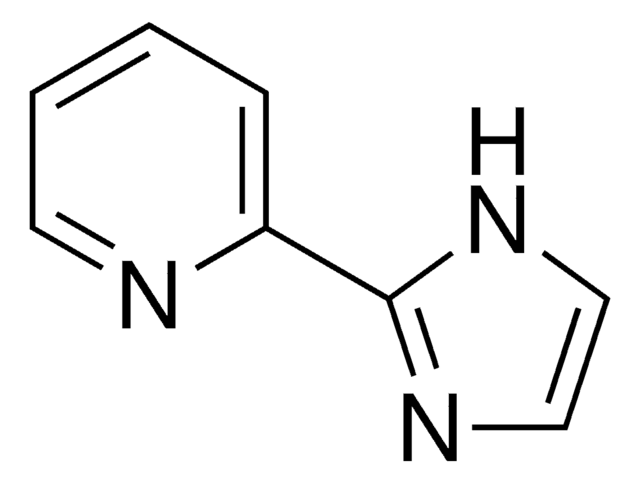183725
4-(Imidazol-1-yl)phenol
97%
Synonym(s):
1-(4-Hydroxyphenyl)imidazole
Sign Into View Organizational & Contract Pricing
All Photos(1)
About This Item
Empirical Formula (Hill Notation):
C9H8N2O
CAS Number:
Molecular Weight:
160.17
EC Number:
MDL number:
UNSPSC Code:
12352005
PubChem Substance ID:
NACRES:
NA.22
Recommended Products
Assay
97%
form
powder
mp
204-206 °C (lit.)
SMILES string
Oc1ccc(cc1)-n2ccnc2
InChI
1S/C9H8N2O/c12-9-3-1-8(2-4-9)11-6-5-10-7-11/h1-7,12H
InChI key
CYKCUAPYWQDIKR-UHFFFAOYSA-N
Application
4-(Imidazol-1-yl)phenol was used in evaluation of estrogenicity of phenolic xenoestrogens by Saccharomyces cerevisiae-based Lac-Z reporter assay.
Signal Word
Warning
Hazard Statements
Precautionary Statements
Hazard Classifications
Eye Irrit. 2 - Skin Irrit. 2 - STOT SE 3
Target Organs
Respiratory system
Storage Class Code
11 - Combustible Solids
WGK
WGK 3
Flash Point(F)
Not applicable
Flash Point(C)
Not applicable
Personal Protective Equipment
dust mask type N95 (US), Eyeshields, Gloves
Certificates of Analysis (COA)
Search for Certificates of Analysis (COA) by entering the products Lot/Batch Number. Lot and Batch Numbers can be found on a product’s label following the words ‘Lot’ or ‘Batch’.
Already Own This Product?
Find documentation for the products that you have recently purchased in the Document Library.
Customers Also Viewed
Wan Qiu Xia et al.
Analytical biochemistry, 554, 9-15 (2018-05-29)
In this study, a molecularly imprinted polymer based chemiluminescence array capable of simultaneous determining phenothiazines and benzodiazepines was first reported. Two polymers were coated in different wells of the conventional 96-well microtiter plate as the recognition reagents, and the added
Effect of substituent size and dimensionality on potency of phenolic xenoestrogens evaluated with a recombinant yeast assay.
Schultz TW, et al.
Environmental Toxicology and Chemistry / Setac, 19(11), 2637-2642 (2000)
Marimuthu Senthilkumaran et al.
Journal of fluorescence, 27(6), 2159-2168 (2017-09-10)
The interaction of n-(4-hydroxyphenyl)-imidazole with p-sulfonatocalix[4]arene is studied using fluorescence technique. The quenching of fluorescence intensity explains the efficiency of binding via binding constant and quenching constant. The excited state lifetime of n-(4-hydroxyphenyl)-imidazole is decreased upon interaction with p-sulfonatocalix[4]arene. The
Yi Cai et al.
Food chemistry, 280, 103-109 (2019-01-16)
In this study, a molecularly imprinted polymer capable of recognizing 8 benzimidazoles was first synthesized. The computation simulation showed that the shape and size of used template were the main factors influencing its recognition ability. Then the polymer was used
Lili Wang et al.
PloS one, 14(10), e0223096-e0223096 (2019-10-11)
Activated platelets release adenosine trisphosphate (ATP) and bioluminescence analysis of ATP release is usually used to monitor activation of platelets induced by various stimulants. However, bioluminescence analysis of ATP possesses poor linearity, the signal is quickly attenuated, and the accuracy
Our team of scientists has experience in all areas of research including Life Science, Material Science, Chemical Synthesis, Chromatography, Analytical and many others.
Contact Technical Service












